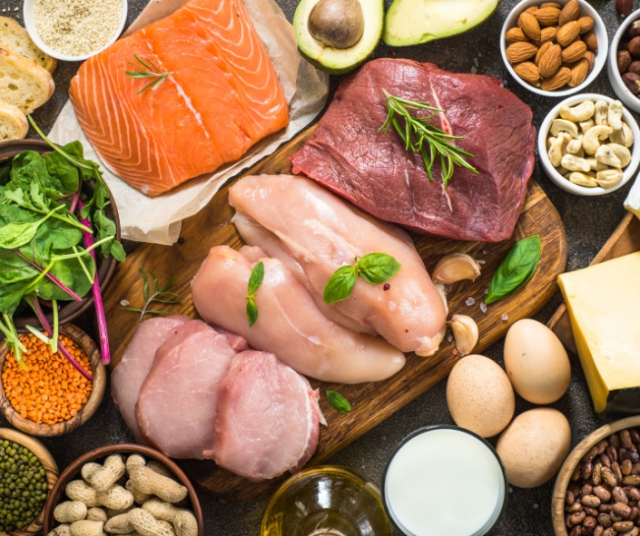Proteins are essential nutrients for the proper functioning of the human body. They are the building blocks of tissues, cells and organs, and play vital roles in almost all biological processes, from cell growth and repair to nutrient transport and hormonal regulation. In this article, we will explore in depth the importance of protein in the diet, the recommended daily intake amount, and healthy sources of protein that can be included to promote optimal nutrition and well-being.
Importance of proteins in the diet.
Proteins are essential macronutrients made up of chains of amino acids. These amino acids are the basic building blocks that our body uses to form and repair tissues, as well as to produce enzymes, hormones and other compounds necessary for the proper functioning of the body. Some of the most important functions of proteins include:
Cell growth and repair: Proteins are necessary for the growth and repair of tissues, including muscles, bones, skin and hair. After exercise or injury, protein helps rebuild and strengthen damaged tissues.
Enzymatic function: Enzymes are specialized proteins that catalyze chemical reactions in the body, facilitating important metabolic processes such as digestion, nutrient synthesis and detoxification.
Nutrient Transport: Some proteins act as transporters, helping to move nutrients, hormones and other molecules through the body. For example, hemoglobin carries oxygen from the lungs to the tissues.
Hormonal function: Some hormones are proteins or are made of amino acids. These hormones regulate a variety of bodily functions, such as metabolism, growth and development, and fluid and electrolyte balance.
Immune health: Antibodies, proteins produced by the immune system, help defend the body against pathogens such as bacteria, viruses and parasites, protecting against infections and diseases.
How much protein should we consume daily?
The amount of protein a person should consume daily varies depending on several factors, including age, sex, physical activity level, health status, and individual nutritional goals. However, general guidelines recommend that protein make up between 10% and 35% of the total calories consumed in a day.
Practical example:
If a person consumes 2,000 calories per day, the recommended protein intake range would be between 50 and 175 grams per day.
It is important to note that the optimal amount of protein can vary depending on individual needs. People who engage in intense physical activity or who are trying to gain muscle may need to consume more protein to support muscle synthesis and recovery. On the other hand, sedentary people or people with certain medical conditions may require less protein in their diet.
Healthy sources of protein.
Below are some healthy sources of protein that can be included in a balanced diet:
Lean meats: Lean meats, such as chicken, turkey, lean beef, and lean pork, are excellent sources of high-quality protein. It is recommended to opt for lean cuts and avoid excess saturated fat.
Fish and shellfish: Fish and shellfish are rich in protein and omega-3 fatty acids, which are beneficial for heart and brain health. Healthy options include salmon, tuna, trout, sardines, shrimp and scallops.
Eggs: Eggs are a complete source of protein, containing all essential amino acids in adequate proportions. They can be consumed whole, but it is important to limit cholesterol intake if you are at risk of heart disease.
Dairy Products: Dairy products such as milk, yogurt, and cheese are good sources of protein, calcium, and other essential nutrients. Opting for low-fat or fat-free options can reduce your saturated fat intake.
Legumes and beans: Legumes, such as beans, lentils, and chickpeas, are excellent sources of plant protein, as well as fiber, vitamins, and minerals. They are a healthy and economical option to increase protein intake.
Tofu and tempeh: Tofu and tempeh are soy-based products that are rich in plant proteins and versatile in cooking. They can be used in a variety of dishes, such as stir-fries, stews, soups, and salads.
Nuts and seeds: Nuts and seeds, such as almonds, walnuts, chia seeds, and pumpkin seeds, are excellent sources of plant protein, healthy fats, and other essential nutrients. They can be enjoyed as snacks or added to salads, yogurts or smoothies.
Quinoa and other grains: Quinoa and other whole grains, such as brown rice, barley, and buckwheat, contain high-quality plant proteins and are an excellent addition to a balanced diet.
Proteins are essential nutrients that play a crucial role in the health and well-being of the human body. By providing the building blocks necessary for the growth, repair and maintenance of tissues and cells, proteins are vital for optimal biological function. By including healthy sources of protein in our diet, such as lean meats, fish, eggs, dairy products, legumes, nuts and seeds, we can promote muscle health, satiety, metabolism and overall well-being. It is important to remember that the quality and variety of protein consumed is as important as the quantity, and a balanced diet that includes a variety of protein sources can help maintain long-term health and well-being.






